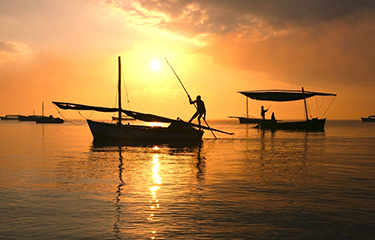Mozambique faces pitfalls on path to harnessing fishing industry

Mozambique’s underperforming fishing industry is likely to continue grappling with declining catches and a degraded marine ecosystem as the government looks for ways to revive and implement a major fishing industry initiative.
Mozambique’s efforts involve the launch of a fishing and security fleet meant to harness and protect its marine resources. The country received the fishing and marine security equipment nearly six years ago from shipbuilder Privinvest as the natural gas-rich country laid out plans that would have enabled it to perform “oversight and control of the country’s exclusive economic zone, set up a viable homemade, home-owned and self-sustaining commercial fishing industry and develop a shipbuilding and ship maintenance industry.”
The contract for the acquisition of the fishing systems and equipment came at a time when Mozambique had been listed among African countries with serious food insecurity, which contributed to the continent’s USD 20 billion (EUR 18 billion) annual fishing and logging losses – hence the need to develop “modern and efficient fishing industry.”
The inability of Mozambique to launch the fishing and security fleet, and a litigious process now underway on how and why the country incurred USD 2 billion (EUR 1.8 billion) debt, now in default, is likely to undermine the drive to fully exploit existing potential in the fisheries sector to support initiatives towards “significant contributions to food security, employment and inclusive growth, while ensuring ecosystem wellbeing for future generations,” according to a World Bank report.
Privinvest had earlier said the contract with the government of Mozambique was to enable the country “to build a local industry to contribute to the economic development of the country and in order to establish sovereignty over its own waters and natural resources after years of poaching and unlicensed exploitation.”
The fishing industry in Mozambique has not been doing well, according to the World Bank report, which describes the country’s fishing communities as “often small, isolated, and poor.”
“Although artisanal fishers produce 85 percent of the annual catch, only 10 percent of the sector’s labor force are employed in processing and marketing, indicating substantial post-harvest economic opportunities,” the report said. “Benefits from semi-industrial and industrial fishing perform well below potential, especially given the increasing interest from small- and medium-sized enterprises (SMEs) for snapper, tuna, swordfish and other high-value species. Recent estimates show that economic rents from shrimp could be increased to approximately USD 30 million (EUR 27 million) per year.”
Moreover, Mozambique, which has made natural gas reserves discovery of more than 180 trillion cubic feet in two parts of the Rovuma Basin offshore, faces the danger of undermining its fishing industry in coming years as the government shifts focus to the extractive industry, “particularly offshore gas extraction, [that is] expected to grow exponentially,” according to the World Bank.
“While this has the potential to transform the country’s economy, the fragile coastal environment will be tested by increasing industrial expansion and marine-based transport corridors,” the report added.
Despite the lackluster performance of Mozambique’s fishing and aquaculture sector, the government did previously secure a USD 850 million (EUR 768 million) bond for a 15-year plan for the development of the country’s tuna fishing industry, as demand for exports of the fish continued to grow in Europe and the U.S.
However, multinational professional services provider Deloitte cautioned the plan “would have a significant impact on growth of the sector but through mismanagement of funds it disintegrated into the current [USD 1.4 billion, EUR 1.26 billion] undisclosed debt scandal, putting authorities in a tight fiscal situation.”
Mozambique’s aquaculture, Deloitte said, “is thereby expected to still remain in its infancy in the medium term but has the potential to serve as a key source of foreign exchange for the country in the long term.”
Photo courtesy of Shutterstock






Share